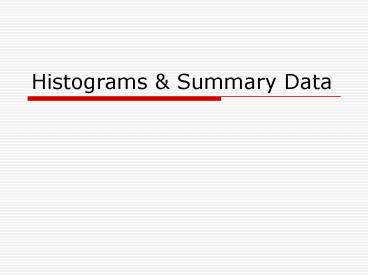Histograms PowerPoint PPT Presentation
Title: Histograms
1
Histograms Summary Data
2
Histograms Summary Data
- Summarizing large of amounts of data in two ways
- Histograms graphs give a pictorial
representation of the data - Numerical summaries gives snapshot of the data
overall - Average, Mode, Median, etc
3
Histograms Summary Data
- Microsoft Excel has several tools that allows to
summarize data - sorting
- Maximum
- Minimum
- range (difference between max and min)
- mean (average)
- grouping data
- plotting a histogram
4
Histograms Summary Data
- Sorting in Excel
Click on Data
Click on Sort
5
Histograms Summary Data
- Sorting in Excel
Store the data to be sorted in a list by columns
Click to sort the column from low to high and
vice versa
Click OK
6
Histograms Summary Data
- Sorting in Excel
- Ex On the class webpage, go to the file
NBAPlayerHeights.xls - File contains data for the top ten player heights
(in inches) by team during the 1990-91 season
7
Histograms Summary Data
- Use the Sort tool in Excel to list all the player
heights from smallest to largest
First, highlight the data you wish to sort
Go to Data and click Sort
Click Ascending, then click OK
8
Histograms Summary Data
- What is the smallest height?
- Answer 67 inches
- What is the largest height?
- Answer 91 inches
9
Histograms Summary Data
- MIN and MAX functions find the minimum value(s)
and maximum value(s) in a list - The range is the maximum minus the minimum
- AVERAGE function finds the average or mean
- SUM function adds numbers in a list
10
Histograms Summary Data
- Excel also has a Histogram tool
- This function separates data into bins
- The function counts how much data lies within
each bin - You can (and should) define the size of the bin
prior to opening the function
11
Histograms Summary Data
- A histogram organizes data into groups by
counting how much data is in each group - The groups are sometimes called bins
- The number of observations in each bin is
called the frequency
12
Histograms Summary Data
- Installing the Histogram feature
Click on Tools and then on Add-Ins
13
Histograms Summary Data
- Installing the Histogram feature
Click on these boxes
Hit OK to install. It will take a few moments
for these packs to install
14
Histograms Summary Data
- Creating a Histogram
Click on Tools
Click Data Analysis
15
Histograms Summary Data
- Creating a Histogram
Click on Histogram
Click OK
16
Histograms Summary Data
- Creating a Histogram
Cells where your data is stored goes here
Your Bin Limits or Bin Widths go here. You need
to type these beforehand in your worksheet
Choose the cell you want the frequencies of your
bins to be displayed in Excel
17
Histograms Summary Data
- Using NBAPlayerHeights.xls, create a histogram
with bin widths of 5 starting at 65 inches
18
Histograms Summary Data
- Create Bin Limits in Excel
Create a cell called Bins
Enter your Bins. Since we want bin to be width 5
there is only a difference of 5 between
consecutive cells.
19
Histograms Summary Data
Cell Range of Data Goes Here
- Create Histogram
Bin range you created goes here
The cell where you want the frequencies to be
displayed
20
Histograms Summary Data
- And the Results . . .
This is the number of uncounted player heights
that were less than or equal to 70 inches
21
Histograms Summary
- Make a column called Labels
- This will used to label your x-axis
22
Histograms Summary Data
- Plotting Our Results
- Click on Chart Wizard
23
Histograms Summary Data
- Select Chart Type
Click Column
24
Histograms Summary Data
- Plotting
Choose Columns
Cell Range of your Histograms Frequencies goes
here
Click Next
25
Histograms Summary Data
- Plotting
Click on Series tab from previous slide
Use s in Labels column
Click on Next
26
Histograms Summary Data
Give an informative title that clearly describes
the graph
Clearly label each axis. Dont forget units!
Click Finish
27
Histograms Summary Data
- And the results
28
Histograms Summary Data
- One last thing . . .
- Left-click on one of the bars
29
Histograms Summary Data
- Then Right-click on one of the selected bars
- Youll get this menu
Click here
30
Histograms Summary Data
Change this to zero
Click this tab
31
Histograms Summary Data
- And now the final results (really!)

